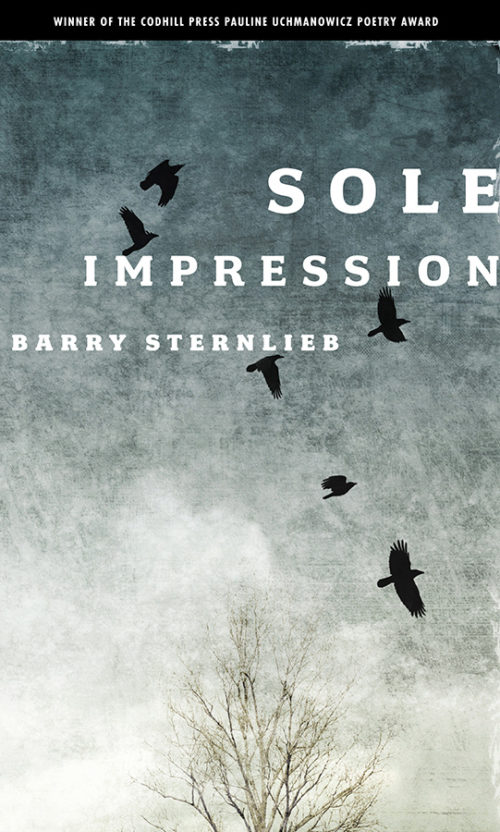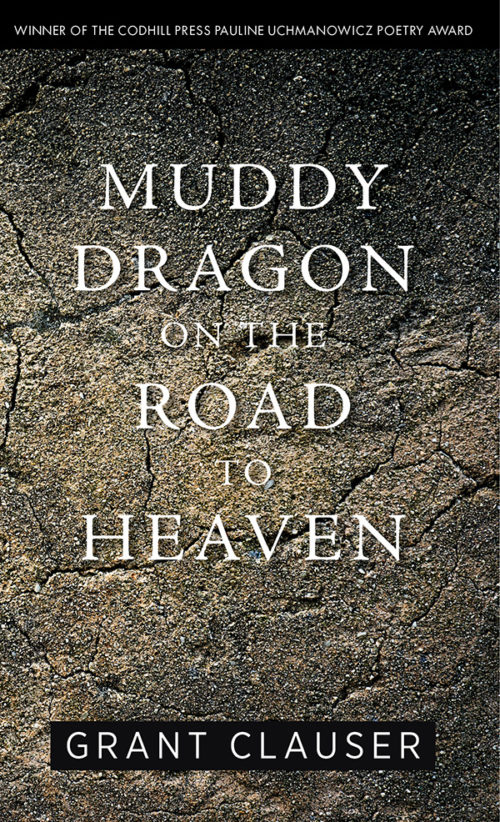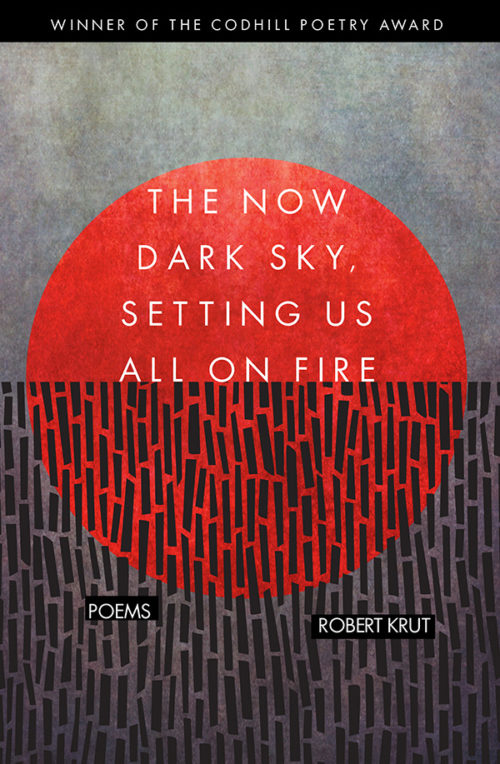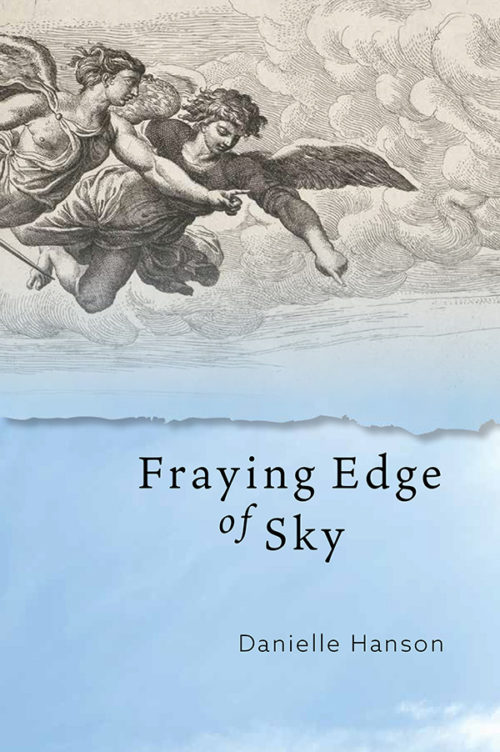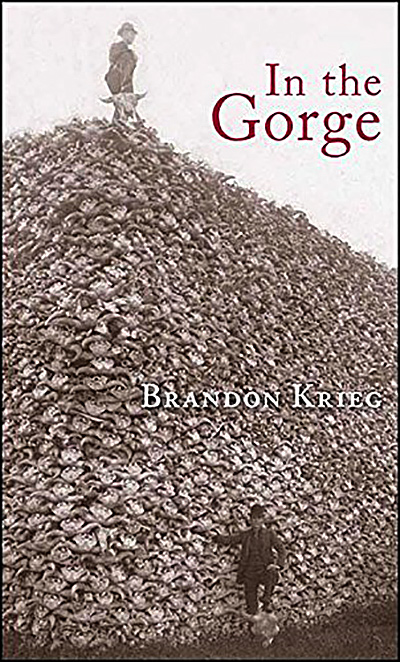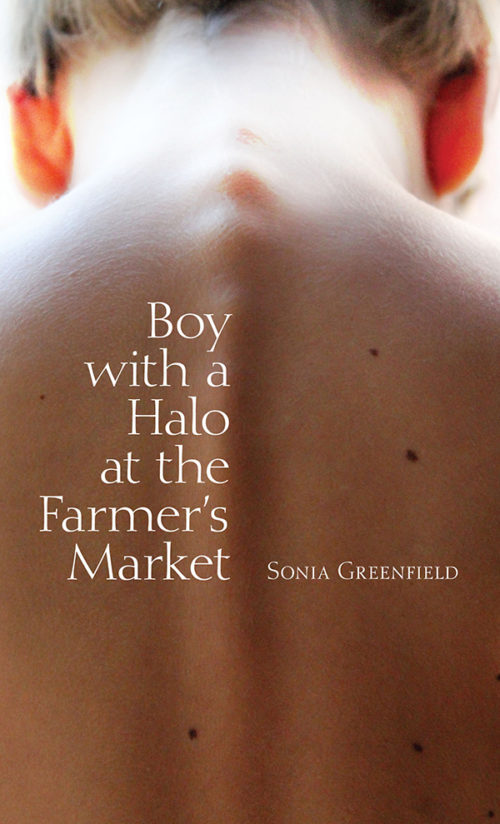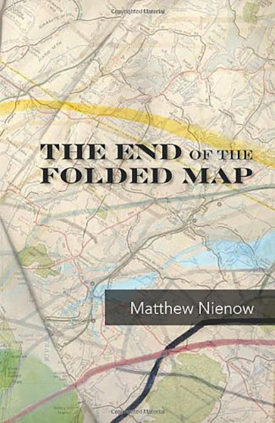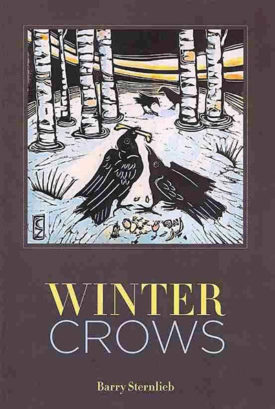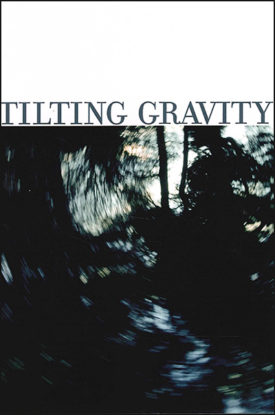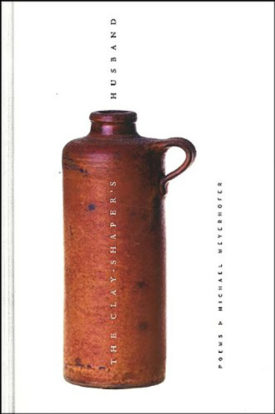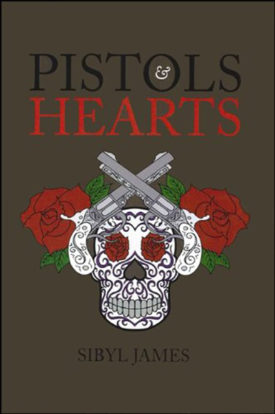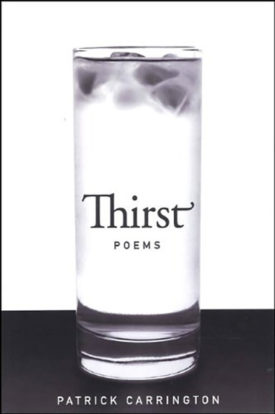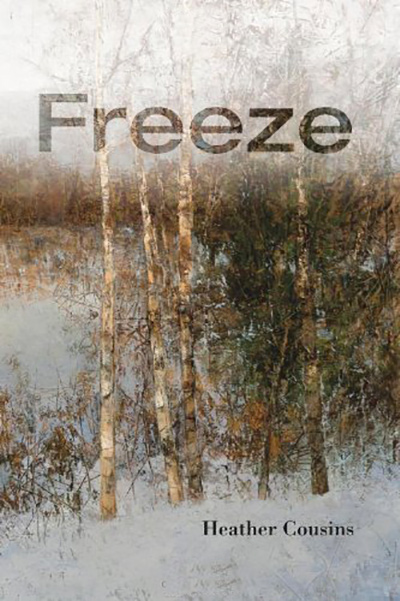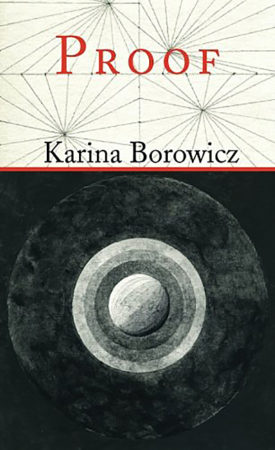-
Sole Impression is a collection of Poetry that covers a broad range of subjects from the personal to the universal. Barry Sternlieb is the author of Winter Crows (2008 winner of the Codhill Press Chapbook Award), and three other chapbooks. His work appears in Poetry, The Yale Review, Southern Review, Virginia Quarterly Review, Sewanee Review, Gettysburg Review, New England Review, Prairie Schooner, Beloit Poetry Journal, Commonweal, and others. He is the recipient of a 2004 Massachusetts Cultural Council Fellowship in Poetry, and also edits Mad River Press, specializing in the very slow creation of handcrafted, limited edition letterpress poetry broadsides and chapbooks since 1986. The Mad River archive is housed in The Chapin Library at Williams College. Paperback Page count: 88 Trim size: 5.5 x 9 in. ISBN: 978-1-949933-12-3
-
The poems in this collection explore social and ecological struggles, personal and public nostalgia, family and solitude and seek to balance it all with hope. Grant Clauser is the author of four previous collections and has won the Cider Press Book Award and the Dogfish Head Poetry Prize. He lives in Pennsylvania where he works as an editor and writer and also teaches poetry at Rosemont College. These finely crafted, deeply evocative poems written with a tenderest heart, questioning mind, and an acutely observant eye, invite us to join the speaker on a trek across history, across intimate landscapes of relationships, human and animal courage, love and grief, global brokenness, and unexpected grace. - Doris Ferleger, author of Leavened and As the Moon has Breath Whatever the topic of his luminous poems--family, nature, childhood or fly fishing--to name a few, Grant Clauser knows that are all related. It is this understanding and wonder that undergirds these poems. Whether the characters in this book "smash atoms/ into each other/ trying to find god" or tie flies because "water is music/ I want to stand in," these poems reach for the place where the known world meets the realm we sense but cannot know. Grant Clauser is a poet who knows the importance of vision, both in the sense of observing what is around us and in being attuned to the worlds to come. "Trust me, this is the world we deserve," Clauser says. We will be more deserving of this world if we heed these wise and luminous poems. - Al Maginnes, author of The Next Place and Music From Small Towns
-
Codhill Poetry Award Winner 2018
In The Now Dark Sky, Setting Us All on Fire, Robert Krut unveils surrealistic imagery and apocalyptic moments that encroach on his cityscapes. Entering his urban vision of off-kilter fingerprint police, helix fireworks, and lockboxes replete with “unsewn / buttons from the shirts of dead men” (“The Vault”), we are invited to witness how “daylight peels silence / off the sides of buildings” to reveal vampire teeth and arrows (“Phantasmagoria at Six AM”), how “every single body on the street / turns to paper” (“At This Very Moment”). Krut dismantles the world around us and in turn remakes it into something dark yet alive, a place seething with desire, where “A thousand leaves are worth one wish” (“This All Starts With You, and This All Ends With You”)From the very first poem in this quiet and intimate collection, Robert Krut inventively crafts image after shape-shifting image, each suggesting an alternate universe designed to help us better understand our real one. From a preacher in a lentil rainstorm to a doorman wearing a hat full of beetles, we meet people (and see places) filled not only with what is real but with what is possible. Between these magical details runs a clear and steady narrative: a speaker who dons the “too-small sweater of summer.” Who knows that “danger isn’t a bomb, danger is a drip.” And who survives “this pension of suffering.” The graceful poems in The Now Dark Sky, Setting Us All on Fire beautifully balance being both agent and acted upon. Krut is a poet of vivid imagery and distinctive voice.—Patricia Colleen Murphy, Hemming Flame
Robert Krut’s newest collection, The Now Dark Sky, Setting Us All on Fire, paints a landscape of imagination where the Lord of Time might be bargained with as we are left “waiting to be swallowed whole.” The seductive tactility of Krut’s language reminds us of our bodies, our bones and teeth, our veins and fingerprints even as we move among dragons and giant arachnids. A provocative pendulum swinging from fantasy to physicality and back again, these poems acknowledge our longing for escape but leave us with the inescapable conclusion that we are tethered now and forever to ourselves and to this blood-drenched world.—KMA Sullivan, Inclined to Riot
A poem inside a poem is a guest, and Robert Krut’s new compilation The Now Dark Sky, Setting Us All on Fire is worth putting the kettle on to serve. I am in awe at his ability with composing words, where the music from deep imagination comes easily to him. I’ve dined with these poems, went for long walks with “Now, Breathe Fire” and “Dear Demon” inside my coat pocket. I wrote his poem “Welcome” on a lotus leaf and posted it on my front door because it reminded that it is good to welcome the essentiality of darkness from time to time. Let these poems be lanterns to the door you are about to open. This collection is a treasure and good reason why we must keep on breathing.—Sam Roxas-Chua, Saying Your Name Three Times Underwater
2019 | 80 pages
-
Codhill Poetry Award Winner 2017
Between the destruction of angels, creation of philosophers, and use of mythological creatures, Fraying Edge of Sky captures a side of the other-world humans don’t see into very often: “A walking stampede, slow and terrible. / The hospital for nonexistent children. / A mountain devouring clouds.” Hanson’s beautiful lyricism and shocking imagery coalesce in wonderment, in poems that play with the power of light and dark, ultimately haunting the pages that make up her magical book, reminding us over and over of how “We are giants over the fallen.”The Experiment Collect light in a bucket of water, pour it off slowly—keep the light from breaking, watch it seep into soil. Now it is dark; time to get rid of the night. Dig a hole to drain it. See how the hole already brims over with darkness, saturated. Dig deeper, with more urgency. Mine the blackness. Keep pushing until fog rises up. Realize you are nothing. * * * The beautiful and fanciful investigations in Danielle Hanson’s Fraying Edge of Sky are homages to magical realism but are also lyrical bursts in splendidly gilt frames. The precise language of the poems conjures up the overlooked details of a world that, in its hurry, will miss them. The light in a bucket of water, the ribbon-like fog, the small mice who are angelic in their infestations—all are an inventory of the miraculous that Hanson’s truly original voice urges us to hear and to hold close. —Oliver de la Paz, author Requiem for the Orchard Dismantling worlds only to rebuild them anew, Danielle Hanson’s poems, little worlds made cunningly, as Donne would call them, expose the surrealism behind the most ordinary things. Take the tailor who “starts by sewing the fraying / edge of sky to a rock” and begins sewing a whole menagerie until he “creates / a daytime field of constellations, / embroidery of a new creation.” New indeed. These are visions like none other and if you want to see with the kind of fourfold vision Blake suggests, this original, this most precious of books is for you. — Richard Jackson, author Broken Horizons Danielle Hanson’s Fraying Edge of Sky traps the sun with mirrors, drowns the moon, staples spiders to the sky. There are strategies and curses, negotiations of light and dark, and, throughout, an ever-thickening swarm of angels that collide, that turn to blood, that infest. Photographs are empty, and even those emptinesses are deleted, leaving new emptinesses that are filled by a relentless drive to see things simultaneously as they are and what they intend to be. A lizard pretends to be a stone, but we still know it is a lizard; it is the pretending that strikes us. This is the heart of Hanson’s poetry: artifice that shows the truth. — Bradley Paul, author Plasma2018 | 80 pages
-
Codhill Poetry Award Winner 2016
In Brandon Krieg’s stunning collection In the Gorge, we are placed on a tightrope, balancing the leisure of Western society against the survival of the natural world. Here, nature and human lunge and parry, conjoined twins in a struggle to the death. Krieg reminds us that our manufactured beauty is part of the planet-wide tableau—“looking down from an overpass / looking up through the canopy / the contrails the sunset / are not different things.” Part pastoral, part elegy for our future on Earth, In the Gorge urges us to believe in mercy, in redemption, and the dire need for entwining ourselves with the natural world. This is a phenomenal work.—Glenn Shaheen, author of Energy Corridor
Cornfields, jet trails and power lines, fences, abandoned mines and greenhouses—human delineations mar but do not yet overpower the nonhuman landscapes in Brandon Krieg’s stark, unerring and beautiful poems that, over and over, seek “to find the way back // to this day among days.” Krieg’s voice is watchfully tender, attentive to nature and to our moment in it, ever aware that even as we leave our signatures after us, so does fireweed. In this lovely ecopoetry, Krieg achieves a “good fearfulness” and even a joy that is no more or less elemental than rain.—Nancy Eimers, author of Oz
Intelligence at its vastest stretches to a scarcest cry, and is ours, and not: you’ll hear it amply in the haunted, restless, dead-on lively poetry to be found in Brandon Krieg’s In the Gorge, a collection that finds its author deep in it, the sorrow and the joy, and the clarities that in this poetry have a luminosity all their own, because they have been seen, because they have themselves seen through us. I marvel at the heights of technique: free verse rising out of necessity to new necessities, new flashes and new spells. Even more considerable here is the marvel of the voice as it propounds resilient—tested, lived—ways into lyric sympathies and a compassion free of attachment, taking up dwelling there, gazing across.—William Olsen, author of TechnoRage
Brandon Krieg is the author of Invasives, a finalist for the 2015 ASLE Book Award in Environmental Creative Writing, and a chapbook, Source to Mouth. His poems have appeared in The Antioch Review, Crazyhorse, FIELD, The Iowa Review, and West Branch. He is an assistant professor of English at Westminster College in Fulton, Missouri.2017 | 74 pages
-
Codhill Poetry Award Winner 2014
Sonia Greenfield explores menace and loss so often, it’s as if her poems are scarecrows to hold against the night. She likes the lyric and persona, likes telling us over and over again, we survive. A master of the unsettling image and moment, she’s got a big imagination and an appetite for the complexity of our lives. “We always bend / our fear into something more useful.” I don’t know if we do, but Greenfield does. The poems in Boy with a Halo at the Farmer’s Market are more than useful—they are beautiful, and demonstrate once more that art is our deepest response to the fragility of life.—Bob Hicok
Sonia Greenfield’s vision is x-ray and technicolor at once. These are poems of tragedy and ecstasy, rendered in high music and beautiful and shocking imagery. It’s rare to find a poem “riveting,” but hers are poems that, once started, refuse to be left unread.—Laura Kasischke
In Sonia Greenfield’s poems, we experience a mind busy with the work of description, and it is through that description—of people known and unknown, of lives on the edge of being unmade, or being sewn back up again—that Greenfield brings us to revelation. By looking at the surface of existence, and by narrating circumstances of particular people in particular places, Greenfield shows us how noticing matters, and how looking at the surface can illuminate the depths.—Mark Wunderlich
2015 | 76 pages
-
Winner of the Codhill Poetry Chapbook Award for 2010, Matthew Nienow’s The End of the Folded Map charts the jagged frontiers of memory with lines of metrical precision and imagistic inventiveness, rendering an atlas of our collective humanness.
—Pauline Uchmanowicz
2011 | 32 pages
-
"Winner of the Codhill Poetry Chapbook Award for 2009," Elizabeth Rees's Tilting Gravity shimmers like moonlight on tidewater, illuminating the ebb and flow of brokenness and recovery with rippling imagination and lyrical elegance."
—Pauline Uchmanowicz, final judge
2010 | 36 pages
-
Out of stockODE TO DOGS I am tired of hearing about dogs used as metaphors for the uncivilized. Imagine a world in which humans possessed at least twenty times as many olfactory receptors, able to distinguish the tang of cancer rising musk-like from the bedsheets next to a smoldering ash tray, able to detect that one drop of blood in every five quarts of water, to know what you did last night no matter how many times you soap-scrubbed the evidence. It does not take savagery but more love than we can muster to lick the hand you've sniffed, to love despite the perfume of sins we wear each day like a halo.
2008 | 38 pages
-
"Final Finalist for the Codhill Poetry Chapbook award for 2008, Sibyl James’s Pistols and Hearts captures the beauty and ruggedness of daily life in Mexico through inventive lyricism. Oscillating between English and Spanish, between declarations of love and regret, between the oracular and the ordinary, a transcontinental vision emerges, both deeply personal and fiercely public."
—Pauline Uchmanowicz, final judge
2009 | 36 pages
-
Out of stockPoems Searching for Things to Worship Sorting through fluttering debris of thick boyhood days, tangle of jungle browned with our absence, I remember how you cupped water at Cedar Creek, your hands a chalice. And flowers you planted near the bank to make it your church, somewhere to sit in the greening comfort of a private prayer. A place one might see God and not be surprised.
"Winner of the Codhill Poetry Chapbook Prize for 2006, Patrick Carrington's Thirst reads like a novena, a plea for understanding and mercy." —Pauline Uchmanowicz, Final Judge2007 | 32 pages
-
Out of stock
"Winner of the 2012 Codhill Poetry Chapbook Award, Heather Cousins's Freeze, as sparse and elegant as winter branches, illuminates how time is both fixed and divisible, the human paradox both archetypal and mutable."
—Pauline Uchmanowicz, Final Judge
2013 | 30 pages
-
Out of stock
Codhill Poetry Award Winner 2013
"God decided suddenly to grow teeth," writes Karina Borowicz in her spare new collection that observes those cataclysms requiring an especially lonely courage to notice. She witnesses them, at times with astounding tenderness, through a thin filter that allows only the right images through, and provides us with the guidance—not necessarily comforting—for beholding them. Whether its locus is in the wild or the eerie domesticity of "neighborhood," each deft poem presents detail, however splendid, that spells trouble. But it is a trouble through which Borowicz knows how to travel, despite danger that is frequently heartbreaking. She does not disturb so much as an ant colony sleeping in winter, but shows us the terrifying loveliness of our vulnerability.—Frannie Lindsay
2014 | 72 pages


